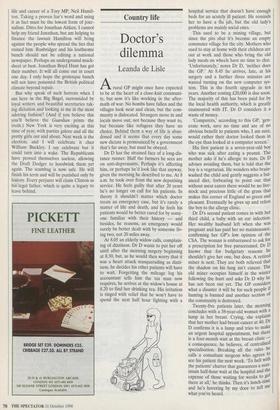Country life
Doctor's dilemma
Leanda de Lisle
Arural GP might once have expected to be at the heart of a close-knit communi- ty, but now it's like working in the after- math of war. No bombs have fallen and the villages look neat and clean, but the com- munity is dislocated. Strangers move in and locals move out, not because they want to, but because like refugees they have no choice. Behind them a way of life is aban- doned and it seems that every day some new dictate is pronounced by a government that's far away, but must be obeyed.
Dr D has the strained face of a long-dis- tance runner. Half the farmers he sees are on anti-depressants. Perhaps it's affecting him, or perhaps he'd look like that anyway, given the morning he described to me. At 8 a.m. he took over from the new deputising service. He feels guilty that after 20 years he's no longer on call for his patients. In theory it shouldn't matter which doctor treats an emergency case, but it's rarely a matter of life and death, and he feels his patients would be better cared for by some- one familiar with their history — and besides, he reasons, an emergency would surely be better dealt with by someone liv- ing two, not 20 miles away.
At 8.05 an elderly widow calls, complain- ing of dizziness. Dr D wants to put her off until after the morning surgery beginning at 8.30, but, as he would then worry that it was a heart attack masquerading as dizzi- ness, he decides his other patients will have to wait. Forgetting the mileage log his accountant tells him the tax man now requires, he arrives at the widow's house at 8.20 to find her drinking tea. His irritation is tinged with relief that he won't have to spend the next half hour fighting with a hospital service that doesn't have enough beds for an acutely ill patient. He reminds her to have a flu jab, but the old lady's problems are mainly social ones.
This used to be a mining village, but since the pits shut it's become an empty commuter village for the city. Mothers who used to stay at home with their children are out at work and those who bring the old lady meals on wheels have no time to chat. `Unfortunately,' notes Dr D, 'neither does the GP.' At 8.45 he arrives, late, at his surgery and a further three minutes are wasted turning on the new computer sys- tem. This is the fourth upgrade in ten years. Another costing £20,000 is due soon. The majority of this has been paid for by the local health authority, which is greatly enamoured with IT. Dr D considers it a waste of money.
`Computers,' according to this GP, 'gen- erate work, save no time and are of no obvious benefit to patients who, I am sure, would rather their doctor looked them in the eye than looked at a computer screen.'
His first patient is a seven-year-old boy who was sick after eating a peanut. The mother asks if he's allergic to nuts. Dr D advises avoiding them, but is told that the boy is a vegetarian. He wonders who brain- washed the child and gently suggests a bal- anced diet, forbearing to point out that without meat eaters there would be no live- stock and precious little of the grass that makes this corner of England so green and pleasant. Eventually he gives up and refers the boy to the allergy clinic.
Dr D's second patient comes in with her third child, a baby with an ear infection. Her wealthy husband left when she was pregnant and has paid her no maintenance, confirming her GP's low opinion of the CSA. The woman is embarrassed to ask for a prescription for free paracetamol. Dr D knows that for budgetary reasons he shouldn't give her one, but does. A retired miner is next. They are both relieved that the shadow on his lung isn't cancer. The old miner occupies himself in the winter following the hunt and asks Dr D why he has not been out yet. The GP considers what a disaster it will be for such people if hunting is banned and another section of the community is destroyed. Twenty-five patients later, the morning concludes with a 38-year-old woman with a lump in her breast. Crying, she explains that her mother had breast cancer at 40. Dr D confirms it is a lump and tries to make an urgent hospital appointment, but there is a four-month wait at the breast clinic — a consequence, he believes, of centralised specialisation. Breaking all the rules he calls a consultant surgeon who agrees to see his patient the.next week. 'To hell with the patients' charter that guarantees a max- imum half-hour wait at the hospital and the expense of those waiting for weeks to get there at all,' he thinks. Then it's lunch-time and he's hovering by my door to tell Me what you've heard.


















































































 Previous page
Previous page